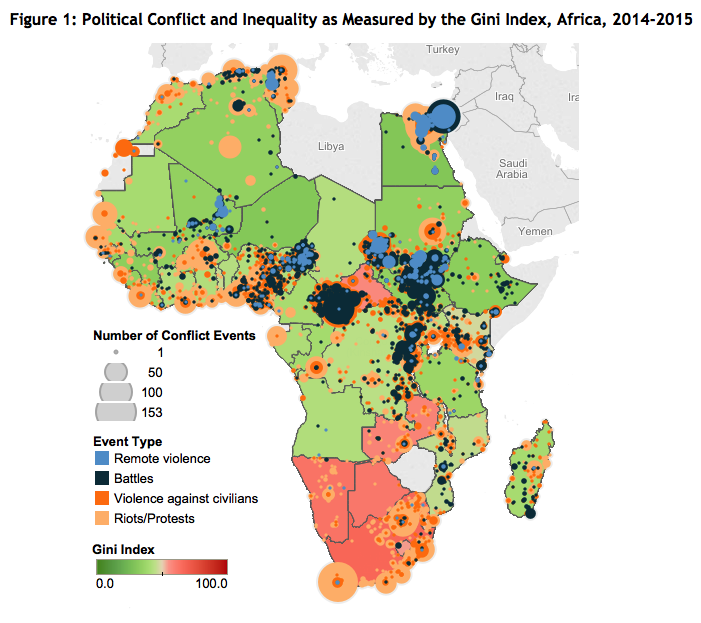-
Roudabeh Kishi, ACLED Project
The Effect of Inequality on Conflict in Africa
September 16, 2015 By Wilson Center StaffMany have noted inequality as fuel for conflict. It can serve to exacerbate grievances amongst those who have less within unequal contexts, which can in turn serve as a mobilizing factor in fueling violence. Alternatively, it can make the “prize” of conflict larger – within the most unequal societies, the poor have less to lose and more to gain.
Using conflict data from the Armed Conflict Location and Event Data (ACLED) project for 2014 and 2015, and inequality data from the World Bank Development Indicators, the effect of inequality on future conflict and violence in Africa is explored here through mapping the geographic locations of all political conflict in Africa over maps of various inequality measures.
Figure 1 maps the effect of inequality as measured by the Gini index on political conflict. The Gini index measures “the extent to which the distribution of income or consumption expenditure among individuals or households within an economy deviates from a perfectly equal distribution.” A Gini index of 0 (green) represents perfect equality (i.e., where everyone has the same income), while an index of 100 (red) implies perfect inequality (i.e., where one person has all the income, and everyone else has 0 income).
Numerous studies argue that increased inequality results in increased violent conflict. In line with this, there are examples of states – such as the Central African Republic – where inequality is high that do indeed exhibit very high levels of conflict. However, the Gini index suggests that inequality within states across much of Africa is not very high – a finding which would refute the inequality-breeds-conflict argument given the extent of conflict across the continent. Indeed, in southern Africa, where inequality is highest, most instability is experienced as riots and protests instead of coordinated armed movements. The societal and political conditions that are associated with riots and protests being the main form of instability are also correlated with fewer episodes of armed group emergence and action. Therefore the relationship between inequality and armed conflict is mediated through the state’s level of economic and political development.
Continue reading on ACLED’s blog.
Sources: ACLED, Collier and Hoeffler (2004), Stewart (2008), The World Bank, World Politics.
 A Publication of the Stimson Center.
A Publication of the Stimson Center.




